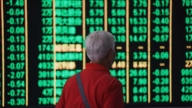【新唐人2014年06月23日訊】中國的房市下滑正在威脅中國的其它經濟領域。從建築工人的工資到傢俱需求,再到鋼材市場的銷售,一切與房地產有關的領域都受到了衝擊。「瑞士銀行」經濟學家指出,房地產「更持久和更急劇下滑」的風險,是中國經濟今、明兩年面臨的最大風險。
美國《華爾街日報》5月報導說,房地產的虛弱,被視為中國放緩經濟的顯著威脅,因為這個行業跟如此多的其它行業互相交織,包括鋼鐵、水泥和家電。美國金融服務集團「花旗」估計,房地產投資直接貢獻中國GDP的12%。但是美國三大信用評級公司之一「穆迪」的分析師認為,如果加上付給建築工人的薪水和相關行業的產出,它對GDP的貢獻超過20%。
而根據美國最大金融服務機構摩根大通的分析師表示,如果中國的房地產投資繼續放緩5%,則將削減中國已經疲軟的GDP增長速度0.6個百分點。在中國未來幾個季度,通過房地產投資放緩和土地銷售收入下滑,房市調整可能構成最大的宏觀風險。
確實地產市場以外的其它行業,已感受到樓市滑坡的影響。據官方數據,今年前五個月,建築和改造,包括內部裝修開支的增長率已降到14.2%,而去年同期增長率為22.1%。
據中共統計局的數據,今年前五個月,傢俱銷售額同比增長14.7%,家電銷售同比增長7.3%。去年同期,傢俱銷售的同比增幅為21%,家電為21.5%。
浙江財經大學教授謝作詩認為,房地產加上相關產業佔據中國經濟的三分之一,樓市下滑當然對經濟會產生很大影響。此外,樓市對經濟的影響還將從企業債務體現出來。
謝作詩:「企業債務很高的。它更多是以房產來作抵押的。這下房價一跌,債務就會惡化嘛。可能會形成債務鏈斷裂,引起支付的困難。」
寧夏燕寶鋼材市場有限公司經理楊利民對《華爾街日報》表示,現在通常是建築公司一年中最忙的時候。但公司今年只銷售了10萬噸鋼材,同比減少30%。
附近出售大理石和瓷磚的批發市場情況大體相同。一位銷售經理告訴《華爾街日報》,5月份以來銷售直線下滑,公司有價值人民幣1000萬元的未售出瓷磚躺在倉庫裡蒙灰。
農民工也遭遇沒活幹的窮境。報導引述在上海打工的建築工人李貴全的話說,由於房地產市場不景氣,他們今年有了更多的「休息」時間。李貴全的工作是安裝水管。他說,從2月份以來就他沒活幹了。只好靠著老闆給的每月人民幣1,000元的固定薪水過活。
而在東莞市的一個傢俱廣場,將近三分之一的攤位都是空的。報導說,一家銷售傢俱和裝飾品的商店老闆陳曉瑩表示,儘管他們公司進行了七五折促銷,但還是生意清淡。她說,租約到期後她會把店舖關掉。
中國互聯網綜合門戶網站《騰訊》財經頻道原編輯張賈龍,日前向《新唐人》表示,中國從1998年到現在,房地產是比較重要的一個支柱產業,並且現在已經是中國最大的一個產業。它如果不好了,整個中國經濟肯定都會受到非常大的影響。
《騰訊》財經頻道原編輯張賈龍:「如果說成交量下降特別快的話,它(房屋)就會降價,如果一降價的話,政府賣地就賣不了了。然後相關的稅費就會下降。有一些中小型的房企可能會出現破產。還有一些以前買房子的人會找它。打砸售樓處之類的。」
《華爾街日報》根據統計局公布的數據計算出來的結果顯示,5月份中國70個大中城市新建住宅平均價格,環比下降0.15%。報導說,這是自2012年5月以來,中國新建住宅均價首度環比下跌。而上海和深圳的房價也小幅下降,表明房價跌勢開始向一線城市蔓延。
「穆迪」上個月削減了中國房地產行業的前景,從「穩定」下調為「負面」,並指出,中國的銷售增長放緩、市場上大量供應過剩。
採訪編輯/秦雪 後製/舒燦
Real Estate Market Downturn Endangers China’s Economy
The slacking-off real estate market in China has impacted
other interrelated industries.
Construction workers’ wages, furniture sales, sales of steel
and other areas connected with the real estate industry all got hit.
Economists UBS bank pointed out that the continuously and
sharply decreasing real estate market will endanger
China’s economy this and next year.
As reported by the Wall Street Journal in May,
the weakening real estate industry has been driving
China’s weakening economy.
The real estate industry intertwines with other industries,
for instance, iron and steel, concrete as well as home appliances.
As estimated by Citi Group, investment in real estate
contributes as much as 12% to China’s GDP.
However, analysts from Moody’s, one of the three biggest
credit rating companies in the United States,
stated that if the wages paid to construction workers
and the proceeds from related industries were counted,
China’s real estate contributes more than 20% to its GDP.
Analysts from JPMorgan think that if the investment in
China’s real estate decreases another 5%, it’ll hit China’s
weakening GPD growth by another 0.6 percent.
In the following few quarters, the slow down investment in
real estate and the decreasing sales revenue from land sales
may develop a macro-environmental risk.
Indeed, industry beyond real estate also got impacted
by the continuously weakening real estate market.
Based on official data, during the first 5 months of 2014,
the spend on home construction and renovation,
including interior decoration, has decreased by 14.2%;
whereas, during the same period last year,
the increasing rate was 22.1%.
From statistical data of the first 5 months of 2014
published by the party’s Statistical Bureau,
the year-on-year growth of furniture sales was 14.7%,
and the year-on-year grow of electrical appliances was 7.3%.
In contrast, it was 21% and 21.5% during the same period last year.
Xie Zuoshi, professor of Zhejiang University of Finance & Economics,
stated that real estate and its interrelated industries
account for one-third of China’s economy.
The slow-down will endanger the economy severely.
In addition, the impact from the real estate industry will
demonstrate itself by corporate debt.
Xie Zuoshi: “Companies pile up debt by
using their properties as collateral.
Now property prices have gone down, default risks will shoot up.
It’s possible the debt chain will break and
it’ll be challenging to pay them off.”
Yang Limin, manager of Ningxia Yan Bao Steel Market Co. Ltd,
told Wall Street Journal right now should be the busiest season
for construction companies. Yet, this year,
his company only sold 100,000 tons of steel products,
a decrease of 30% compared to last year.
It’s a similar situation for those who sell marble or tiles.
A sales manager told the Wall Street Journal,
sales have been sharply decreasing since May.
They still have piles of unsold tiles worth 10 million
Chinese Yuan lying in the storage room.
It’s also challenging for migrant workers to find a job.
In the report, a construction worker Li Guiquan said that
they have a more relaxing time this year since
the real estate industry has been slow.
Li is a plumber and said he hadn’t had any business
since February. Now he lives on the 1,000 Chinese Yuan
fixed amount of money paid by his boss every month.
In a furniture market in Dongguan,
about a third of the booths are empty.
Chen Xiaoying, who sells furniture and decorations,
said that even when their company offered 25% discount,
their business is still very slow.
Chen said her store will be shut down after the lease expires.
Zhang Jialong, former editor of Tencent’s
finance and economic channel,
told NTDTV that the real estate industry has been functioning
as a pillar supporting China’s economy since 1998.
Now it has evolved into the biggest industry in China.
If the real estate market crashes,
it’ll severely impact China’s economy.
Zhang Jialong: “If sales volume continues dropping fast,
home prices will go down. Once home prices come down,
the governments can’t sell the land out.
Then the tax revenue will go down accordingly.
Some small and medium-sized developers might go bankrupt.
Moreover, those who bought homes from bankrupt developers
will search for them and smash sales offices. ”
Based on data published by the party’s Statistics Bureau,
the new home average price has gone down by 0.15%
in 70 big and medium cities in May. The report, says
it was the first time new home prices dropped since May 2012.
Home prices in Shanghai and Shenzhen also went down slightly.
It shows that the lowerprices have been spreading to the big cities.
Last month, Moody’s downgraded the outlook of China’s
real estate industry from “stable” to “negative”.
It also pointed out that the housing market has slowed
and supply exceeds demand.
Interview & Edit/QinXue Post-Production/ShuChan



























